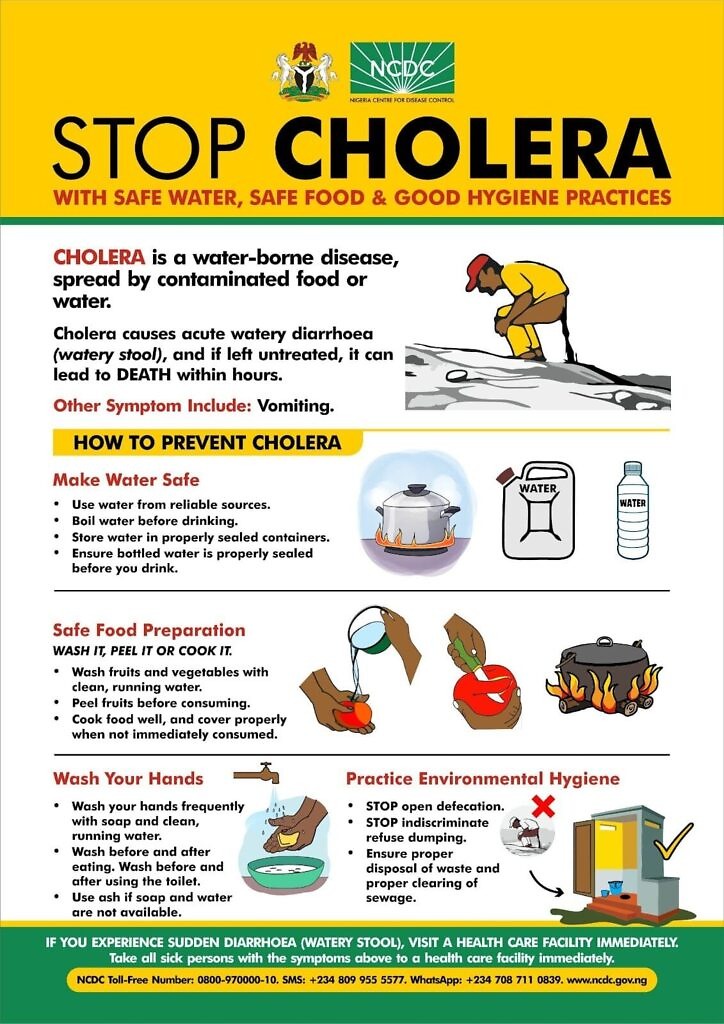
Cholera in Nigeria: Could Your Hygiene Habits Be Putting You at Risk?
Cholera in Nigeria: Could Your Hygiene Habits Be Putting You at Risk?
Cholera remains a significant public health challenge in many parts of the world, including Nigeria. The recent outbreak in Lagos underscores the importance of understanding how to prevent, recognize, and treat this disease. This guide provides actionable tips and insights that Nigerians will find valuable in combating cholera.
Understanding Cholera
Cholera is an acute diarrheal illness caused by infection of the intestine with the bacterium Vibrio cholerae. It is primarily spread through contaminated water and food. The disease can cause severe dehydration and death if left untreated, but it is preventable and treatable with prompt action.
Symptoms of Cholera
Recognizing the symptoms of cholera early is crucial for effective treatment. Symptoms can appear within hours to five days after infection and include:
- Watery Diarrhea: Often described as “rice-water stools,” it is usually pale, milky, and has a distinct smell.
- Vomiting: Often occurring with diarrhea, contributing to fluid loss.
- Rapid Heart Rate: Due to dehydration.
- Loss of Skin Elasticity: Skin may not return to normal when pinched.
- Dry Mucous Membranes: Dry mouth, throat, and nose.
- Low Blood Pressure: Resulting from severe dehydration.
- Muscle Cramps: Caused by electrolyte imbalances.
- Extreme Thirst: Due to fluid loss.
If you or someone you know exhibits these symptoms, it’s critical to take immediate action.
When to Visit the Pharmacy or Hospital
Knowing when to seek medical help is vital. Here’s a guideline:
- Visit a Pharmacy:
- For mild symptoms, where the patient is still able to drink and eat.
- To obtain Oral Rehydration Salts (ORS) for initial rehydration.
- To get zinc supplements, which can help reduce the severity and duration of diarrhoea.
- Visit a Hospital Immediately:
- If there are signs of severe dehydration (very dry skin, sunken eyes, rapid heartbeat).
- If the patient is unable to keep fluids down due to vomiting.
- If there is little or no urine output.
- If diarrhoea is persistent and severe.
- For children, the elderly, and individuals with compromised immune systems who exhibit symptoms of cholera.
Prevention of Cholera
Preventing cholera primarily involves ensuring access to clean water, practising good sanitation, and maintaining proper hygiene. Here are actionable tips:
- Ensure Safe Drinking Water:
- Always drink water from a safe, treated source.
- Boil water for at least one minute or use water purification tablets.
- Store water in clean, covered containers.
- Practice Good Sanitation:
- Use toilets or latrines; do not defecate in open areas.
- Dispose of faeces safely, especially of young children.
- Ensure waste is kept away from water sources.
- Maintain Proper Hygiene:
- Wash hands thoroughly with soap and water, especially before eating or preparing food, and after using the toilet.
- Use hand sanitizers if soap and water are not available.
- Keep nails short and clean.
- Safe Food Practices:
- Eat food that is freshly cooked and still hot.
- Avoid raw foods, including fruits and vegetables, unless you can peel them yourself.
- Wash fruits and vegetables with treated water.
- Community Measures:
- Participate in community clean-up campaigns to keep the environment clean.
- Report any cases of cholera to health authorities immediately.
- Educate others about the importance of hygiene and sanitation.
Treatment of Cholera
Effective treatment of cholera involves prompt rehydration and, in severe cases, antibiotics.
- Rehydration:
- Oral Rehydration Salts (ORS): ORS solutions are the cornerstone of cholera treatment. They can be prepared by mixing ORS packets with clean water.
- Homemade Rehydration Solution: In the absence of ORS, a homemade solution can be made by mixing six teaspoons of sugar and half a teaspoon of salt in one liter of clean water.
- Intravenous Fluids:
- For severe dehydration, intravenous (IV) fluids may be necessary. This requires medical attention and should be administered in a hospital.
- Antibiotics:
- Antibiotics can reduce the duration of symptoms and the volume of rehydration fluids needed. They should be used under medical supervision to prevent resistance.
- Zinc Supplements:
- For children, zinc supplements are recommended as they reduce the severity and duration of diarrhea.
Current Outbreak in Lagos, Nigeria
The recent cholera outbreak in Lagos has highlighted the need for increased vigilance and adherence to preventive measures. The Lagos State Government has been proactive in disseminating information and providing resources to combat the outbreak. Here are some specific actions being taken:
- Public Awareness Campaigns: Educating the public on the importance of hygiene, safe water, and sanitation.
- Distribution of ORS and Zinc: Ensuring that pharmacies and healthcare centers are stocked with necessary supplies.
- Water Quality Monitoring: Increasing efforts to monitor and ensure the safety of water sources.
- Rapid Response Teams: Deploying teams to areas with reported cases to provide immediate medical and logistical support.
Conclusion
Cholera is a preventable and treatable disease, but it requires timely action and adherence to preventive measures. By understanding how to recognize symptoms, when to seek medical help, and how to prevent infection, Nigerians can protect themselves and their communities. The current efforts by the Lagos State Government are commendable, but continuous vigilance and community cooperation are essential to overcome this public health challenge. Stay informed, stay safe, and take proactive steps to ensure your health and the health of those around you.

